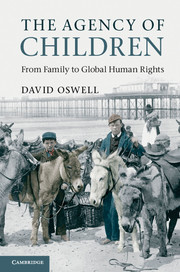Book contents
5 - Subjectivity, experience and post-social assemblages
Published online by Cambridge University Press: 05 April 2013
Summary
The sociology of childhood in the early 1990s was often too quick to conflate children’s experience with social agency and too quick to dismiss some contemporary theoretical approaches which seemed to deny children experiential authenticity and agency. But it is precisely in such approaches (which some have called ‘postmodern’ and others ‘post-structuralist’) that we find a sense of agency which is both dispersed, or distributed, but also fractured, or disarticulated. Post-structuralist approaches, broadly conceived, have been concerned with the unsettling and decentring of the subject (in terms of their originary cognitive individuality, experience, authenticity and authority) by virtue of the fact of language as a symbolic system and of the unconscious. Through a focus on language, discourse and narrative, any notion of agency as centred on the individual child is criticised on the bases of the fracturing of subjectivity and its constructed and performative nature. Dramatic languages of actor, staging, performance and mise en scène (stage setting) are often deployed in critical accounts to emphasise the constructed and decentred nature of subjectivity. But the post-structuralist turn has itself been criticised and problematised through a thoroughgoing anti-humanist set of approaches which intend to analyse social relations in terms of objects, material culture, technologies and devices. In this materialist turn there is a sense in which agency is now understood in terms of its being both human and non-human, both social and technological, and both cultural and natural. It is in the context of both these turns (post-structuralist and materialist) that a descriptive detailing is made available which has both problematised any notion of children’s agency and made its observation deeper and richer.
- Type
- Chapter
- Information
- The Agency of ChildrenFrom Family to Global Human Rights, pp. 62 - 84Publisher: Cambridge University PressPrint publication year: 2012



